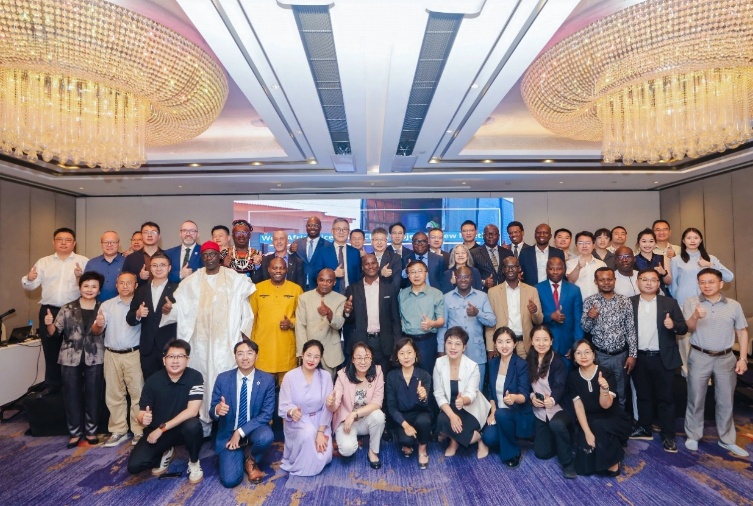
1. Introduction
Since 2022, the United Nations World Food Programme (WFP), with support from the Bill & Melinda Gates Foundation, has implemented the West Africa Rice Value Chain project (RCV project) in Côte d’Ivoire and Guinea to enhance rice productivity, competitiveness, and resilience through promoting locally adaptable Chinese agricultural technologies. Building on the 2021 post-harvest loss reduction initiative in Côte d’Ivoire, led by the WFP Centre of Excellence for Rural Transformation in China and the United Nations Office for South-South Cooperation, the project has strengthened the capacities of smallholder farmers and local communities, improving production efficiency, market access, and value chain returns. It also serves as a platform for technical exchange and cooperation between China and Africa, contributing to food security, better livelihoods, and the scaling up of successful agricultural practices across West Africa.
Against this backdrop, the RVC Project Review Meeting was held on June 17, 2025, in Guangzhou, Guangdong Province, China, bringing together over 60 participants from China, Côte d’Ivoire, Guinea, Cameroon, Sierra Leone, Togo, Guinea-Bissau, and other West African nations. The meeting reviewed the project’s achievements, impacts and lessons, showcased China’s experiences in rice development, and explored pathways to scale up effective practices across Africa.
Participants represented government agencies, research institutions, the private sector, and WFP country offices. The event was jointly supported by the WFP Centre of Excellence for Rural Transformation in China (WFP China COE), the Bill & Melinda Gates Foundation, the Regional Centre of Excellence against Hunger and Malnutrition (CERFAM), and national governments of participating countries.
2. Opening Session
The meeting opened with remarks from key partners, including Mr. Zhao Bing, WFP China Representative/Director; Zhu Qinghua, Deputy Director of the Bill & Melinda Gates Foundation China Office; Li Ming, Director-General of the International Department of the China International Development Cooperation Agency (CIDCA) ; Marc Nene, Director of CERFAM; Masae Shimomura, Deputy Country Director of WFP Guinea; and Amadou Touré, Director of Processing and Marketing at the Ministry of Agriculture and Rural Development of Côte d’Ivoire.
All speakers commended the strong collaboration among partners. Special recognition was given to the Bill & Melinda Gates Foundation for its strategic funding, WFP’s China’s COE for mobilizing Chinese expertise, CERFAM for coordination, and WFP country offices in Côte d’Ivoire and Guinea for effective field implementation. Chinese research institutions and enterprises were also acknowledged for their technical contributions. .
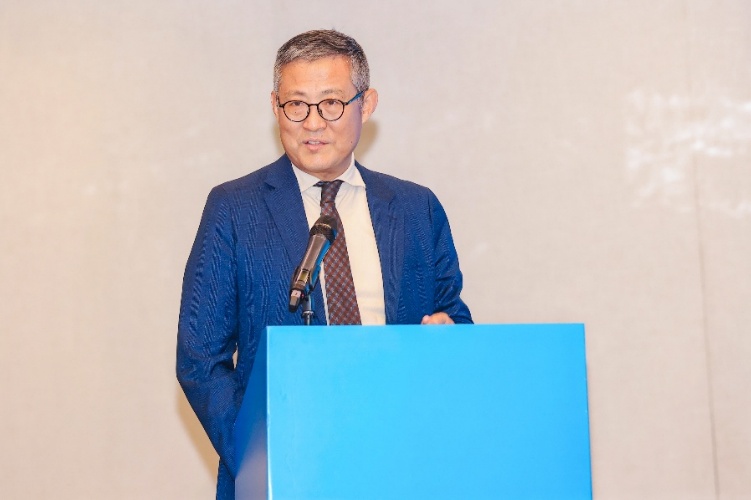
Zhao Bing, Representative/Director of WFP China
Zhao Bing (WFP China): Zhao highlighted the RVC project as a model of South-South, North-South, and multilateral cooperation, noting tangible results: rice productivity increased by 20%-40%, post-harvest losses dropped from 30% to 15%, and farmers’ incomes rose by about 30%. These achievements demonstrate the enormous potential of China-Africa collaboration in advancing sustainable agricultural development. He reaffirmed WFP China’s commitment to working with all parties to explore ways to enable China's cost-effective technologies to take deeper root in West Africa, promote technology localization, policy coordination, and resource integration, scale up proven models, strengthen the resilience of African agriculture, and contribute to long-term food security.
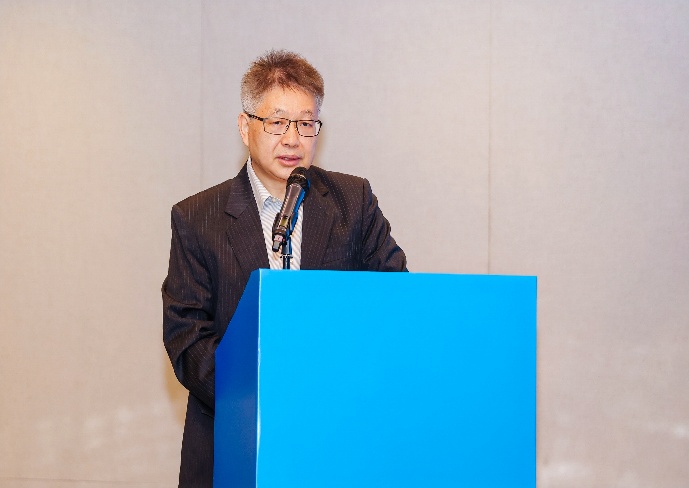
Zhu Qinghua, Deputy Director of the Beijing Office of the Bill & Melinda Gates Foundation
Zhu Qinghua (Gates Foundation): Zhu stressed the importance of collective action in addressing global challenges and highlighted the project’s broader goal of creating a self-sustaining agricultural ecosystem in West Africa. He noted that China’s accumulated expertise in rice development provides a strong foundation for agricultural transformation and reaffirmed the Foundation’s commitment to advancing practical cooperation projects.
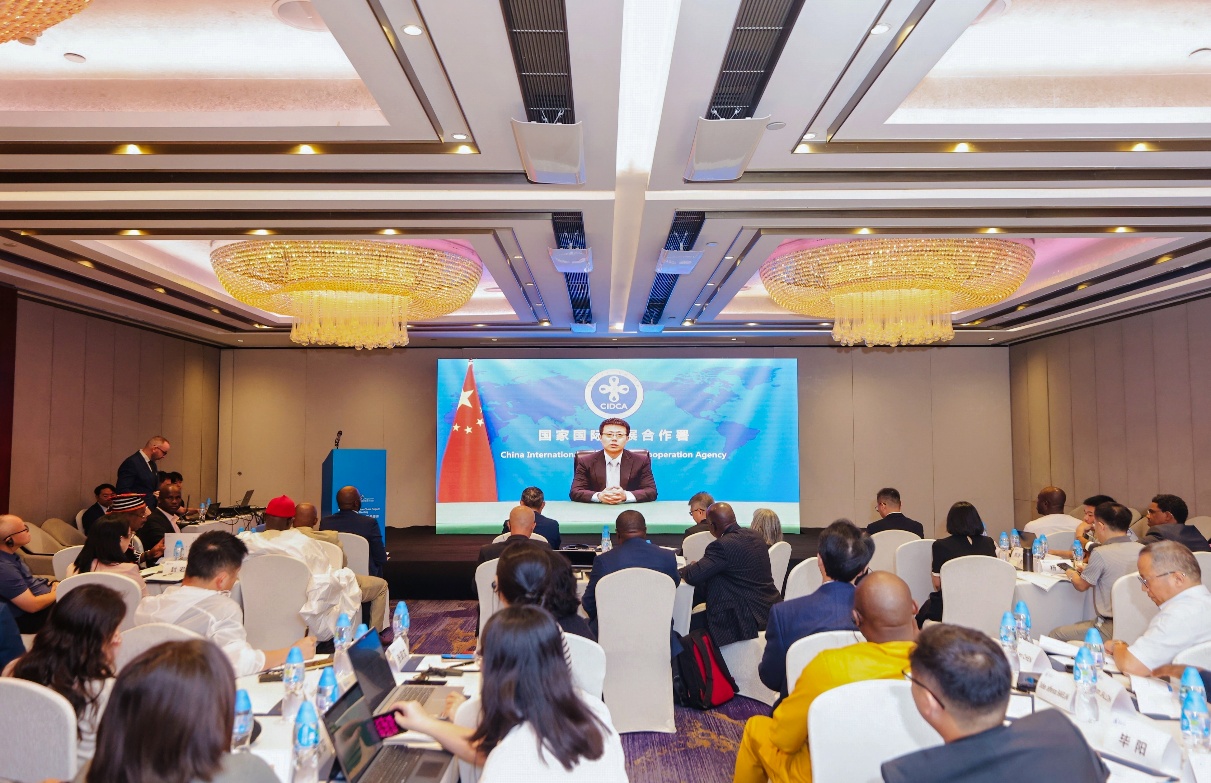
Li Ming, Director-General of CIDCA
Li Ming (CIDCA): In his video address, Li underlined China’s longstanding role in providing practical "Chinese solutions" to support global food security through hybrid rice promotion, demonstration centres, and technical training. He noted that China has supported over 40 WFP projects in Africa through the Global Development and South-South Cooperation Fund. Marking the 20th anniversary of the Forum on China–Africa Cooperation, he pledged that China would continue to leverage global development initiative platforms and cooperation funds to carry out more practical projects. This includes effective operating the China-Africa-UN cooperation demonstration centre, solidly promoting "1,000 small and beautiful projects," and supporting Africa in achieving food security and sustainable development goals.
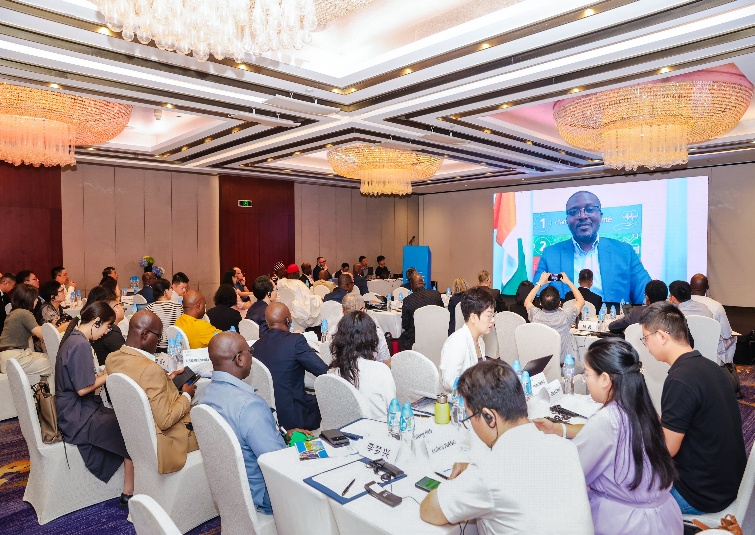
Marc Nene, Director of CERFAM
Marc Nene (CERFAM): Nene emphasized in his video speech that the project goes beyond productivity gains by reshaping rural livelihoods, strengthening food systems, and promoting independent development in Africa through innovative partnership. In Guinea, over 1,000 women have benefited from agricultural technology and leadership training, resulting in significant increase in rice yields and enhanced decision-making power for women in households and communities. In Côte d’Ivoire, technology promotion has achieved remarkable outcomes: 89% of beneficiary farmers now use mini silos to improve grain storage, 99% benefit from rice processing equipment, and 97% of non-beneficiaries show strong interest in new technologies. He described the project as a unique combination of African leadership, Chinese innovation, and global support.
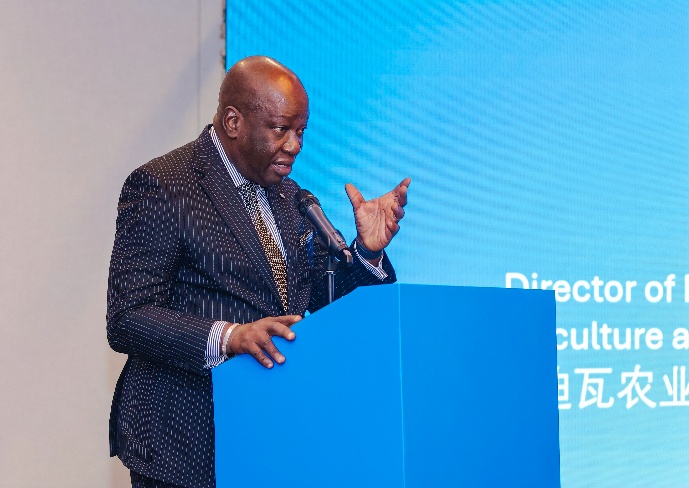
Amadou Toure, Director of Processing and Marketing Department, Ministry of Agriculture and Rural Development of Côte d'Ivoire
Amadou Touré (Côte d’Ivoire): Touré reaffirmed Côte d’Ivoire’s goal of rice self-sufficiency by 2030 and recognized the project’s role in strengthening competitiveness, reducing reliance on imports, and enhancing food security by strengthening grain storage and processing capabilities. He called for greater investment in infrastructure construction, particularly in irrigation systems and rural road improvements, and agricultural technologies to foster the sustainable development of the agriculture.
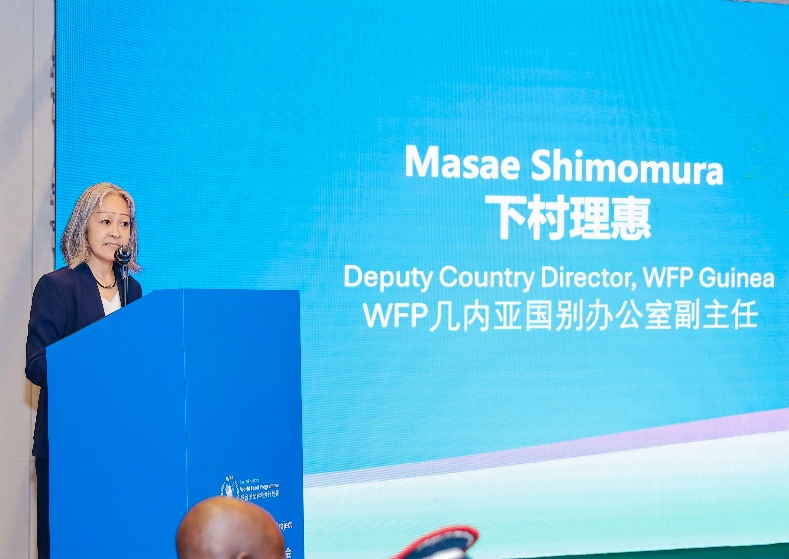
Masae Shimomura, Deputy Director of WFP’s Country Office in Guinea
Masae Shimomura (WFP Guinea): Shimomura shared the remarkable achievements of the project in community promotion, noting that it provided key equipment to the local area, including rice processing production lines, small-scale grain silos, and community warehouses, effectively enhancing community resilience and substantially improving food security levels. She stressed the need to localize equipment production to reduce costs, expand training in machinery operation and maintenance, and strengthen farmers’ skills to independently maintain and utilize agricultural machinery thereby fostering the stable development of agricultural production.
In conclusion, speakers underscored the significance of China-Africa cooperation and South-South and triangular cooperation in driving agricultural development and food security. The RVC project was described as a model for such cooperation, successfully matching China’s rice development experience with Africa’s local needs. This collaboration provided a replicable and practical model for enhancing food system resilience and accelerating progress toward Sustainable Development Goal 2, “Zero Hunger.”
3. Project Review: Achievements, Impacts, and Insights
The project’s achievements were highlighted during the meeting, showcasing contributions to improved rice productivity, reduced post-harvest losses, enhanced technology transfer, farmer capacity building and women’s empowerment. It served as a model for effective China-Africa collaboration in the rice sector.
Agricultural Production Support: This project supported rice-growing communities by providing essential agro-inputs, including 1,675 kg of rice seeds, 13,350 kg of fertilizer, along with more than 10 small agro-machines such as tractors and threshers. It promoted good agricultural practices, leading to substantial yield improvements. In Côte d’Ivoire, farmers’ yields rose from 0.8 to 2.2 tons per hectare, while in Guinea, farmers’ average yields improved by 15%, from 2.5 to 2.9 tons per hectare.
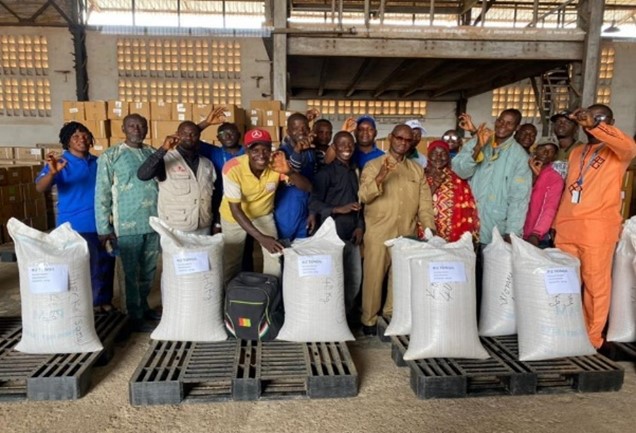
Smallholder farmers in Guinea receive agricultural inputs
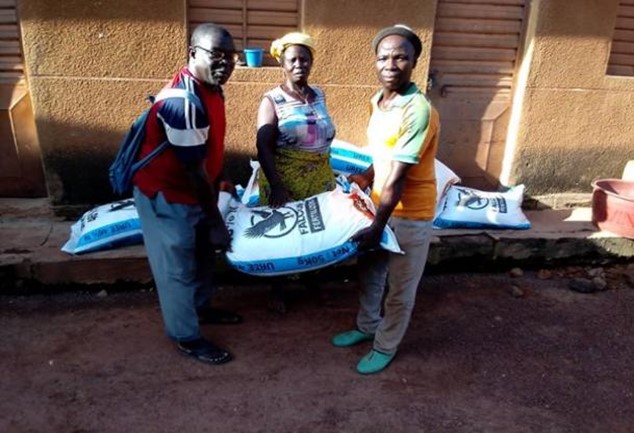
Smallholder farmers in Côte d’Ivoire receive agricultural inputs
Post-Harvest Management and Processing: Post-harvest management was strengthened through the construction of four community grain storage facilities and two rice processing workshops equipped with rice processing lines. Additionally, 600 steel mini-silos were distributed to smallholder farmers, and a steel mini-silo manufacturing line was established in Côte d’Ivoire. These efforts reduced post-harvest losses from 25% to 10% and increased farmer incomes by one-third.
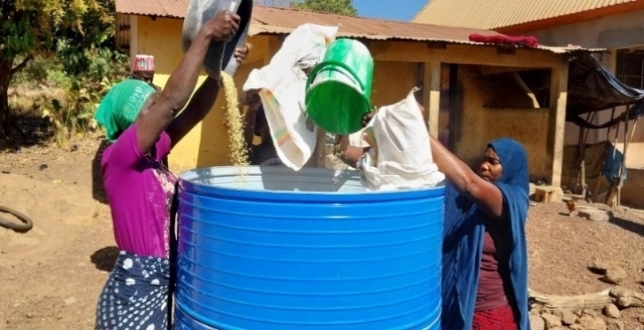
Smallholder farmers with steel mini silos in Guinea
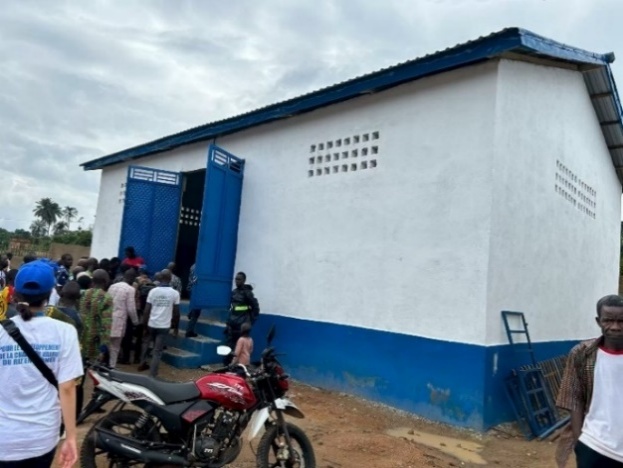
Grain warehouse in CIV
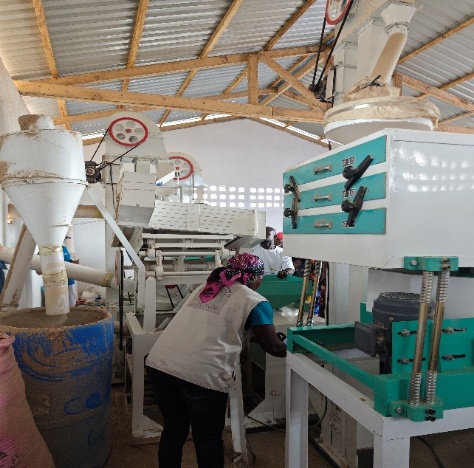
Rice processing line in Guinea
Capacity Building and Training: The project included four on-site trainings, two study tours to China, and nine online courses. Policy advocacy was enhanced through three seminars, one policy dialogue, and over 50 media coverage. These initiatives boosted stakeholder engagement, knowledge sharing and project visibility.
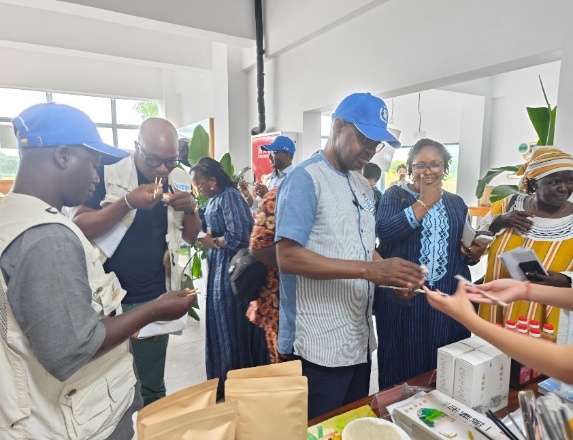
Visit Tianxin Village in Chengdu City, China
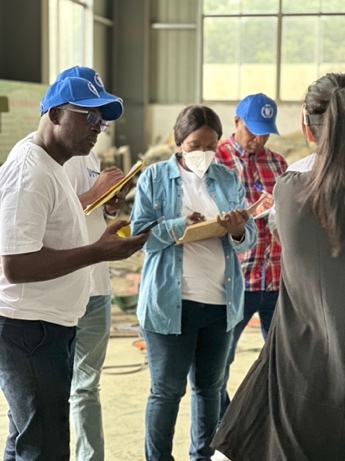
Field visit in Jiangsu Province, China
Innovation and Replicability: The project marked the first field initiative under the China-Africa Rice Value Chain mechanism and WFP China COE’s first on-the-ground implementation in Africa. It deepened the understanding of West Africa’s rice sector needs and provided a foundation for targeted interventions. The project also advanced a more effective coordination model, shifting from short-term capacity building to sustained three-year collaboration with Country Offices, creating a replicable framework for future projects.
4. Rice Sector Development Strategies and Experience of Guangdong Province in China
Pan Junfeng, Deputy Director of the Rice Research Institute at the Guangdong Provincial Academy of Agricultural Science, shared insights on the rice development strategies and experience of Guangdong province in China.
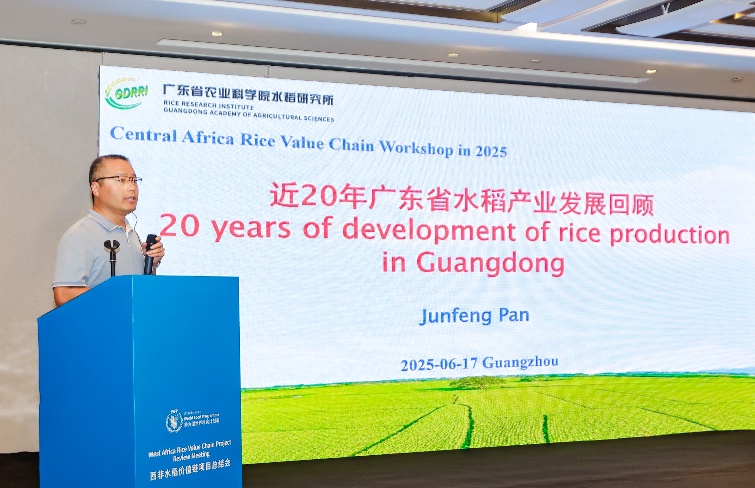
Pan Junfeng, Deputy Director of the Rice Research Institute at the Guangdong Provincial Academy of Agricultural Science
Guangdong’s Rice Sector
Rice is the largest crop in Guangdong province, with production and acreage remaining stable over the past 20 years. The province has shifted towards high-quality rice and sustainable, ecological agriculture practices. Key innovations include high-yield cultivation techniques, seed broadcasting, integrated fertilizer and pest control, fragrance enhancement, low-carbon farming, and diversified ecological practices. Mechanized rice production has advanced significantly: between 2011 and 2023, mechanical transplanting expanded from 115,000 ha to 720,000 ha, cultivation increased from 1.25 to 1.77 million ha, and harvesting grew from 1.76 to 1.82 million ha. Mechanization rates in 2023 reached 36.4% for transplanting, 97% for cultivation, and 99% for harvesting.
Government Support
Government subsidies for agricultural machinery, along with policies supporting rice variety research, extension services, and rice industry parks, have driven these advancements. Dr. Pan recommended strategies for African rice development, including improving farmland infrastructure, promoting mechanization, developing high-yield rice varieties, and ensuring reliable channels for agricultural inputs both domestically and internationally.
5. Chinese-Assisted Rice Programs in Africa
Liaoning International Economic and Technical Cooperation Group (Côte d’Ivoire)
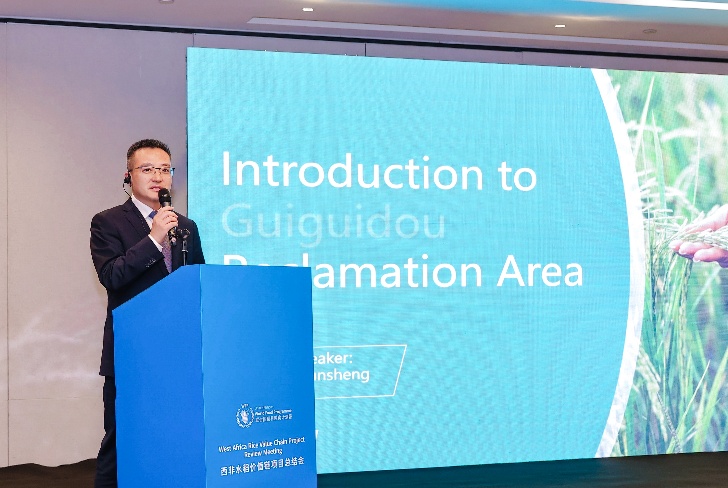
Qu Yunsheng, Deputy General Manager of Liaoning International Cooperation Company
Qu Yunsheng, Deputy General Manager, reported that the company introduced climate-adapted Chinese rice varieties and mechanization techniques, and provided training to over 2,000 smallholder farmers. Key success factors included capacity-building initiatives, effective demonstration farms, and the development of four locally certified rice varieties. Their demonstration farm doubled yields from 2.5 to 5 tons per hectare. Building on these achievements, the company aims to collaborate with WFP and Côte d’Ivoire agencies to further promote locally adapted Chinese rice technologies and has also established community partnerships in schools and employment initiatives.
Longping High-Tech (The Gambia)
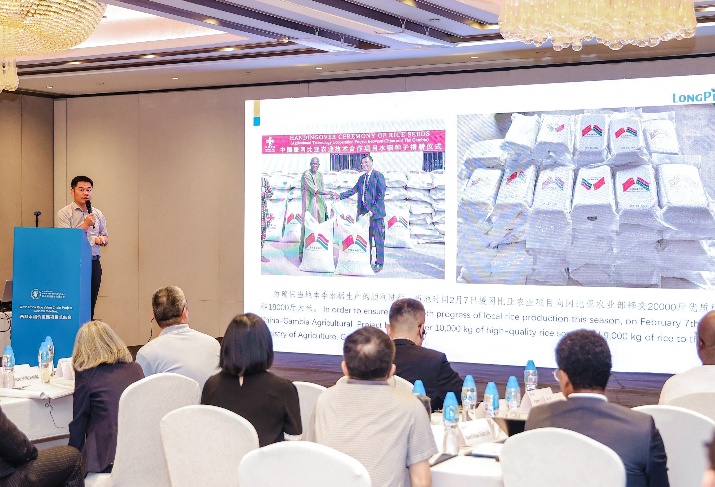
Liu Famou, Managing Director of Foreign Aid Program of Longping High-tech
Dr. Liu Famou, Managing Director of the Foreign Aid Program, highlighted the introduction of high-yielding hybrid rice varieties to Gambia, achieving 10.7 tons per hectare, triple the local average. The project also rehabilitated infrastructure and trained over 2,200 farmers. An innovative partnership model enabled leading farmers, in collaboration with Maruo Farms and others, to form service provider offering mechanization services, purchasing rice from smallholders, and contributing to WFP’s school meals program, thereby fostering sustainable agricultural development.
China Farm (Wuhan) Good-Seed Technology Co., Ltd. (Sierra Leone)
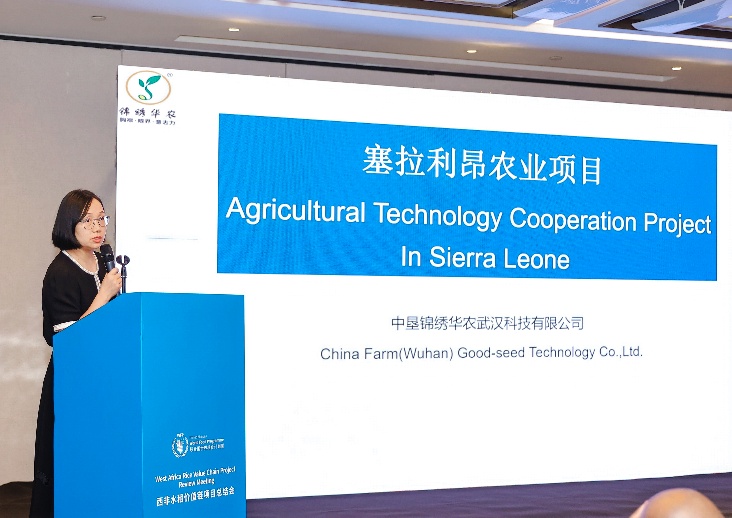
Liu Honghui, Director for Overseas Business of China Farm (Wuhan) Good –seed Technology C0., Ltd.
Ms. Liu Honghui, Director for Overseas Business, reported the introduction of high-yielding, stress-resistant Chinese rice varieties to Sierra Leone, achieving yields of 9–10.7 tons per hectare, far above the local average of 2–5 tons/ha. The project included farmland rehabilitation, demonstration plots, and provision of tractors, harvesters, and dryers. Key recommendations emphasized targeted subsidies, appropriate machinery selection, technical training, and expanded farmer demonstrations to further support agricultural development.
6. Roundtable Discussions
Two roundtable discussions focused on the challenges and opportunities of adopting Chinese equipment and technology in Africa.
Roundtable I: Machinery and Equipment
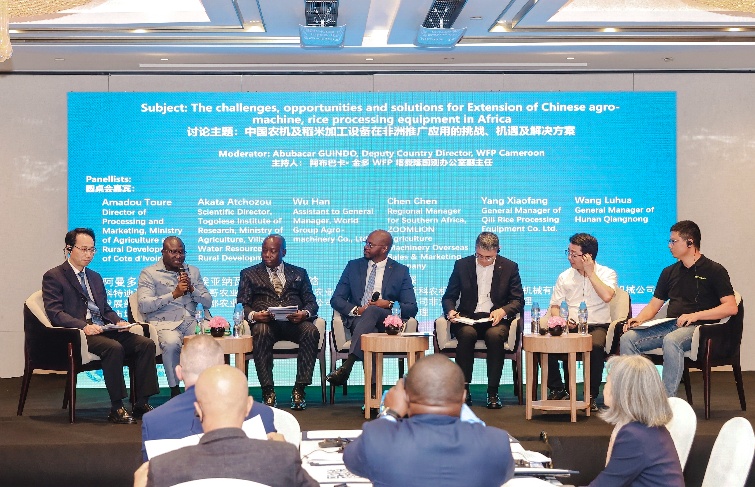
Panellists from Chinese companies and African government agencies identified key challenges of adopting Chinese equipment and technology in Africa, including limited local service networks, inadequate after-sales support, inconsistent quality, lack of adaptation to smallholders, financing barriers, and durability concerns. Recommendations focused on designing affordable, climate-resilient machinery, expanding technician training, promoting leasing and pay-as-you-go models, and strengthening local partnerships for spare parts and service hubs.
Roundtable II: Rice Production Technology and Supporting Policies
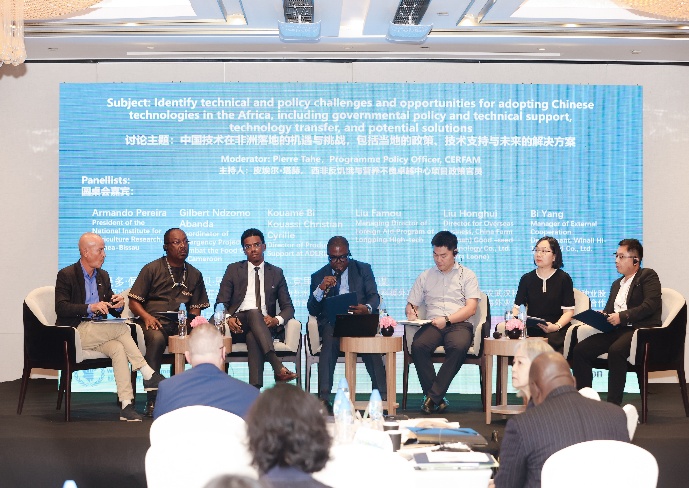
Panellists, including African government and Chinese aid program representatives, highlighted the need for high-yield, climate-resilient seed varieties, water-saving techniques, and post-harvest innovations. Key challenges included underdeveloped seed systems, knowledge gaps, and infrastructure deficits. Solutions proposed included localized seed R&D with African research institutes, farmer and technician training programs, and coordinated mechanisms for policy and technical information exchange.
7. Closing Session: Sustainability and Future Directions
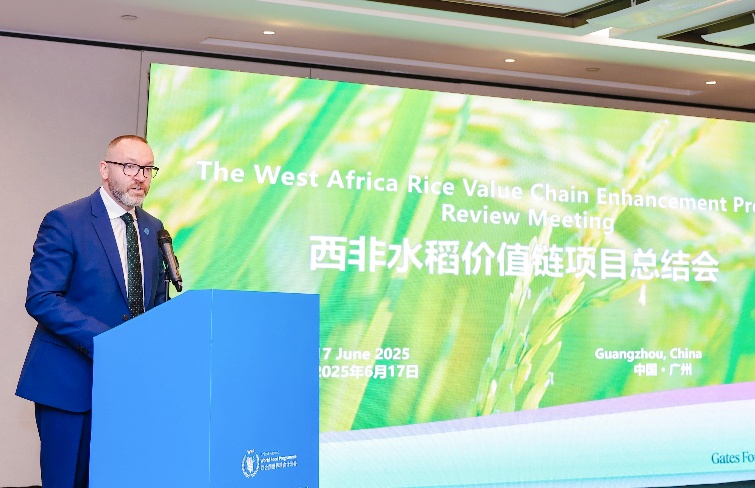
Simon Clements, Deputy Director of WFP China
Simon Clements, Deputy Director of WFP China, concluded the meeting by acknowledging the contributions of all partners and emphasized the importance of leveraging project assets and ongoing training through South- South and Triangular Cooperation to ensure sustainability. He noted that the comprehensive review of the project highlights the significance of multilateral partnerships, effective coordination, and tailored interventions for sustainable agricultural development and food security in West Africa. The closing remarks emphasized that the review meeting marked not the conclusion of the project but the beginning of a new chapter in collaborative efforts to strengthen resilient rice value chains in the region.

